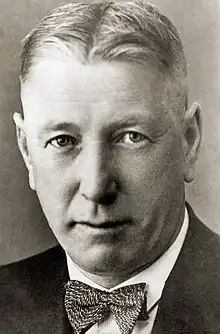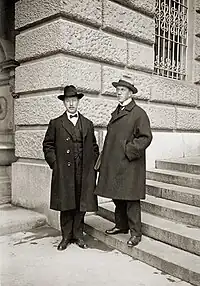Wilhelm Beck
Wilhelm Beck (26 March 1885 – 20 January 1936) was a political figure from Liechtenstein who was one of the founders of the Christian-Social People's Party and served as the President of the Landtag of Liechtenstein from 1922 to 1927.
Wilhelm Beck | |
|---|---|
 | |
| President of the Landtag of Liechtenstein | |
| In office January 1922 – December 1927 | |
| Monarch | Johann II |
| Preceded by | Friedrich Walser |
| Succeeded by | Anton Frommelt |
| Personal details | |
| Born | 26 March 1885 Triesenberg, Liechtenstein |
| Died | 20 January 1936 (aged 50) Walenstadt, Switzerland |
| Political party | Christian-Social People's Party |
| Spouse |
Maria Anna Bürke (m. 1921) |
| Children | 4 |
Early life
Beck was born on 26 March 1885 in Triesenberg to the son of farmer and plasterer by the same name and his mother Karolina Schädler as one of five children. He attended primary school in the town and state school in Vaduz.[1]
From 1903 to 1905 he attended the University of St. Gallen, and from 1905 to 1911 he studied law at the University of Zurich and also at the Ludwig Maximilian University of Munich from 1909, where received a diploma in 1911. He was a member of the historical association of Liechtenstein and published various works on topics of Liechtenstein history, such as inheritance law and constitutional history.[lower-alpha 1][1]
Law career
Beck briefly worked in an insurance company in Geneva. In 1912 he worked with Swiss lawyer and councillor Emil Grünenfelder who supported Beck throughout his career. He worked at a law firm in St. Gallen until 1914 when he opened his own law firm in Vaduz, Ritter & Beck Rechtsanwälte.[1]

In 1926, fellow lawyer Alois Ritter joined his office and the two worked together.[2] Beck was a pioneer of Liechtenstein financial services and fiduciary services. Together with Emil Beck (no relation), he wrote the Liechtenstein Personal and Company law, which came into force in 1926.[3] By 1930, almost half of Liechtenstein's domiciliary companies were founded by Beck and Ritter.[1][2]
Political career
In 1912 Beck became involved in politics when he publicly criticized the Liechtenstein trade regulations that were revised in 1910.[4] In 1913 he spoke out in the Triesenberg community in favour of increasing the poor fund instead of building a new church in the town. Beck criticized the existing poor law, worker welfare and child protection as anti-social and the Liechtenstein constitution as undemocratic. In 1914 Beck formed an opposition group around himself and founded a newspaper associated with it, which he edited until 1921.[1] His opposition to the political foundations of Liechtenstein and the economic crisis during World War I often led him to entering fierce debates with Leopold Freiherr von Imhof, the Governor of Liechtenstein.[5]

By November 1918, Beck along with fellow opposition members Martin Ritter and Fritz Walser, deeply dissatisfied by Leopold Freiherr von Imhof's handling of the economy and who wanted a Liechtensteiner head of state, proposed a motion of no confidence against him. Imhof asked for a vote of confidence and at the same time agreed to submit his resignation. While the Landtag of Liechtenstein unanimously expressed its confidence in him it was decided, against the constitution, to transfer the power of Governor to a Provisional Executive Committee led by Martin Ritter and Johann II accepted Imhof's resignation on 13 November.[6]
Beck was a co-founder of the Christian-Social People's Party in 1918 and he was elected into the Landtag of Liechtenstein in the same year.[7][8][9] As a member of the Landtag, he worked in irradiating Austrian influence over Liechtenstein following their defeat at the end of World War I and establishing closer relations with Switzerland, eventually cultivating in a customs union being established between the two countries in 1924.[10]
When Johann II appointed Josef Peer Governor of Liechtenstein in 1920, Beck and the Christian-Social People's Party opposed his appointment in contrast to the Progressive Citizens' Party as they believed the role should only be reserved for Liechtensteiners.[11] Eventually it was agreed that Peer could take the position, but only for a 6-month period.[12]
Beck played a key role in Liechtenstein's constitutional revision. He wrote a draft constitution which limited the power of the Prince of Liechtenstein for a constitutional monarchy on a democratic and parliamentary basis.[1] With assistance from Josef Peer, he forwarded the demands of both parties through the agreement previously made for Peer's tenure, many of which were loosely based on the Swiss Federal Constitution.[13][14][15] Beck's draft formed the basis of the constitution of Liechtenstein, which was ratified on 5 October 1921.[16]
After the Christian-Social People's Party won the 1922 Liechtenstein general election Beck was appointed to serve as the President of the Landtag of Liechtenstein.[9][17] He also served as the chairman of the board of directors of the National Bank of Liechtenstein during this time.[1] He worked to revise personal and corporate law in the country.[18][19] He had also advocated for the establishment of diplomatic relations with the Holy See.[20]
In 1928 the government of Gustav Schädler was the subject of an embezzlement scandal involving the National Bank of Liechtenstein. Johann II forced his government, including Beck, to resign in June 1928 as a result, and early elections were called.[21] Beck was not barred from re-election, but he did not run in the 1928 Liechtenstein general election.[1][22] In 1932 an indictment was conducted against Beck in the State Court of Justice for violating supervisory and official duties in the administration of board of the directors of the National Bank of Liechtenstein, which resulted in him being ordered to pay for damages in 1935, though he appealed this ruling, he did not live to see it's outcome.[1][21]
After the 1928 Liechtenstein general election Beck took over the leadership of the Christian-Social People's Party and was again elected to the Landtag of Liechtenstein in 1932.[7][9] Shortly before his death, the Christian-Social People's Party and Liechtenstein Homeland Service merged to form the Patriotic Union in 1936.[23][24]
Beck died on 20 January 1936 in Walenstadt, aged 50 years old.[25]
Personal life
Beck married Maria Anna Bürke (8 September 1887 – 2 August 1968), a teacher from Wittenbach on 2 June 1921 and they had four children together.[1]
Literature
- Das Fundrecht. Nach dem schweizer. Zivilgesetzbuch unter Berücksichtigung des kantonalen und ausländischen Rechts dargestellt (1911)
- Das Recht des Fürstentums Liechtenstein (1912)
- Eheliches Güterrecht und Ehegattenerbrecht nach unsern Rechtsquellen (1917)
- Unternehmungen und selbständige Vermögensverwaltungen im Fürstentum Liechtenstein (1926)
Notes
- See literature section.
References
- Leipold-Schneider, Gerda (31 December 2011). "Beck, Wilhelm". Historisches Lexikon (in German). Retrieved 30 September 2023.
- Büchel, Donat (31 December 2011). "Ritter, Alois". Historisches Lexikon (in German). Retrieved 25 May 2023.
- Berger, Elisabeth (31 December 2011). "Personen- und Gesellschaftsrecht (PGR)". Historisches Lexikon (in German). Retrieved 20 October 2023.
- "Die „Oberrheinischen Nachrichten" kritisieren die Gewerbeordnung von 1910, insbesondere die restriktiven Bestimmungen betreffend den Befähigungsnachweis im Baugewerbe". Staatsarchiv des Fürstentum Liechtenstein (in German). 4 July 1914. Retrieved 30 September 2023.
- Quaderer, Rupert (31 December 2011). "Imhof, Leopold Baron von". Historisches Lexikon (in German). Retrieved 3 October 2023.
- Quaderer, Rupert (31 December 2011). "Novemberputsch 1918". Historisches Lexikon (in German). Retrieved 3 October 2023.
- Marxer, Wilfried (31 December 2011). "Christlich-soziale Volkspartei (VP)". Historisches Lexikon (in German). Retrieved 30 September 2023.
- Vincent E McHale (1983) Political parties of Europe, Greenwood Press, p609 ISBN 0-313-23804-9
- Nohlen & Stöver, p1182
- "Switzerland and Liechtenstein: December 2000". World Trade Organization. 2000-12-06. Retrieved 2012-09-16.
- Quaderer, Rupert (31 December 2011). "Peer, Josef". Historisches Lexikon (in German). Retrieved 18 September 2023.
- Quaderer, Rupert (31 December 2011). "Schlossabmachungen (Septemberabmachungen, Schloss-Protokoll)". Historisches Lexikon (in German). Retrieved 18 September 2023.
- Quaderer, Rupert (31 December 2011). "Peer, Josef". Historisches Lexikon (in German). Retrieved 18 September 2023.
- Quaderer, Rupert (31 December 2011). "Schlossabmachungen (Septemberabmachungen, Schloss-Protokoll)". Historisches Lexikon (in German). Retrieved 18 September 2023.
- Brunhart, Arthur (1996). Die Schlossabmachungen vom September 1920. Studien und Quellen zur politischen Geschichte des Fürstentums Liechtenstein im frühen 20. Jahrhundert (in German). Vaduz: Vaterländischen Union.
- Nohlen, D & Stöver, P (2010) Elections in Europe: A data handbook, p1156 ISBN 978-3-8329-5609-7
- "Mitglieder - Präsidenten" (in German). March 27, 2019. Archived from the original on 2019-03-27.
- "Wilhelm Beck und Emil Beck kommentieren den Gesetzentwurf zum Personen- und Gesellschaftsrecht". Staatsarchiv des Fürstentum Liechtenstein (in German). February 1925. Retrieved 30 September 2023.
- "Kurzer Bericht über die Revision des Personen- und Gesellschaftsrechts von Wilhelm Beck und Emil Beck". Staatsarchiv des Fürstentum Liechtenstein (in German). November 1925. Retrieved 30 September 2023.
- "Landtagspräsident Wilhelm Beck legt Fürst Johann II. die Gründe für die von ihm propagierte Errichtung einer diplomatischen Vertretung beim Heiligen Stuhl dar". Staatsarchiv des Fürstentum Liechtenstein (in German). 8 July 1927. Retrieved 30 September 2023.
- Büchel, Donat (31 December 2011). "Sparkassaskandal". Historisches Lexikon (in German). Retrieved 18 May 2023.
- Vogt, Paul (1987). 125 Jahre Landtag. Vaduz: Landtag of the Principality of Liechtenstein.
- "Parties in Liechtenstein 1921-1943". Prince and People: Liechtenstein Civics (in German). 2007. Retrieved 14 May 2023.
- Marxer, Wilfried (31 December 2011). "Patriotic Union (VU)". Historisches Lexikon (in German). Retrieved 14 May 2023.
- "Dr Wilhelm Beck tot". Liechtensteiner Vaterland (in German). 22 January 1936. Retrieved 30 September 2023.